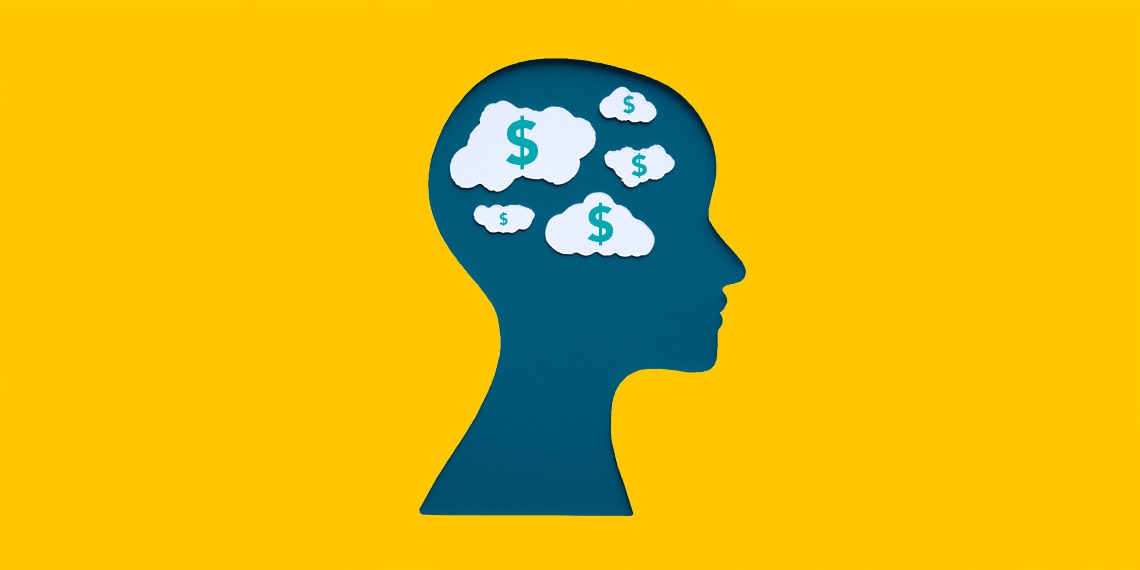
Do you feel bogged down with the stress of work, the panic of social distancing or the unease of watching your portfolio go haywire amid today’s market volatility? You’re hardly alone. Life today practically requires some degree of self-care. After all, tending to your physical and mental needs helps put those larger—and seemingly urgent—concerns in perspective.
Trends in self-care have gained a foothold across American culture, and in the last few years, we’ve seen a greater focus on meditation, healthy living and eating, and “mindfulness”—the art of staying aware of your thoughts and environment. But a truly holistic approach to self-care should also include your financial well-being.
That’s important, because when people are happy with the state of their finances, they also tend to be happy with their overall lives, according to “Money & Saving: What They Mean in 2020,” a survey from RVC and Money.com. But while more than 80% of the men in the survey said they tend to be happy with their financial lives, only 60% of women report the same. Because they feel less satisfied with their finances, women tend to seek out better habits when it comes to saving and making financial decisions in collaboration with their partners.
Mindfulness
Practicing mindfulness can reduce stress (and even bring down associated health costs), but you can also practice money mindfulness. This art is about being present and honest with yourself, and accepting your thoughts without judgment—strategies that translate directly to financial well-being.
● Be Present. Make sure you are present for every one of your financial decisions. This might mean thinking twice before you make an impulse purchase online, but it also may involve reevaluating your ongoing budget. Be aware of every dollar that comes in and out of your wallet.
● Redefine Success. Do you already have a clear vision of what success looks like for you, or are you chasing an unrealistic idea? The art of mindfulness encourages you to trust your own thoughts, including what you think makes you successful.
● Take One Step at a Time. Be mindful of how you attack your goals. If you’re starting on a new goal, be aware of the steps required to reach it, but focus on the current step rather than looking at the future. Remember that saving money is a series of steps.
Fitness
Your workout routine makes you feel good (when you stick to it), and the same goes for your financial routine. Even if social distancing has forced you to get your reps in at home rather than at the gym, you can still use the underlying lessons to work on your financial health.
● Stick to a Routine. Fitness is an ongoing process, and experts recommend that adults should exercise for at least 150–300 minutes per week. Finances, too, are an ongoing process, so set aside time each week to work on them (don’t worry, you won’t need five hours).
● Work on Personal Bests. Runners have PBs for their races, and weightlifters always strive to add weight to their records. To save money, focus on hitting your own PBs: the most money saved from a single paycheck, say, or the longest streak without withdrawing money.
● Track Your Progress. Fitness goals are mostly long-term, because one workout is never enough. Yoga enthusiasts, like many athletes, often track their progress toward goals in a journal. In the same vein, consider keeping a financial journal; it will help you see your progress week by week.
Meditation
Taking a half hour in the morning to clear your mind and reset for the day can help you focus on what lies ahead. Many people seek guided meditation from podcasts, but it’s also something you can do on your own. And setting aside a few minutes every day to focus on your finances can have the same positive result.
● Take the Right Amount of Time. Meditation can take five minutes or an hour; the practice is meant to be ongoing, so make sure your commitment makes sense for your schedule. If you’re constantly busy, a two-hour meditation session might be too much, but you can probably carve 10 minutes out of your day. The same goes for reviewing your finances: Taking even five minutes every day could make a difference without upsetting your other routines.
● Stay Attuned. Meditation is about being aware of your thoughts, emotions and sensations. If you’re feeling distant from your money decisions, take the time to get closer and pay attention to each and every dollar.
● Focus on Your Breathing. Close your eyes and focus on your breath. One goal of meditation is to make you more conscious of your body and your environment. Homing in on the smallest parts of your life (and your finances) can help you gain perspective.
Holistic, Healthy Living
Healthy living is a choice and a way of building a better life, which is why self-care experts often focus their practices on finding the perfect “balance” for mind, body and soul. It’s important to find the right balance for your finances as well.
● Consider All of Your Value. Money is one type of capital, but there are other types of capital to consider. Your identity, skills and knowledge are all valuable; your finances are just one part of your overall worth.
● Foster Self-Love. The goal of self-care is ultimately to help you pay attention to yourself and improve your lifestyle. Just remember there are some things you may not be able to change about yourself—or may take longer to adjust than you expect. If you have trouble changing your financial practices, accept yourself while you work toward a solution.
Adam Shalvey is a writer and editor living in Rhode Island. His work has appeared in many financial publications.
LEARN MORE: 4 Ways to Set Your Child Up for Financial Success

